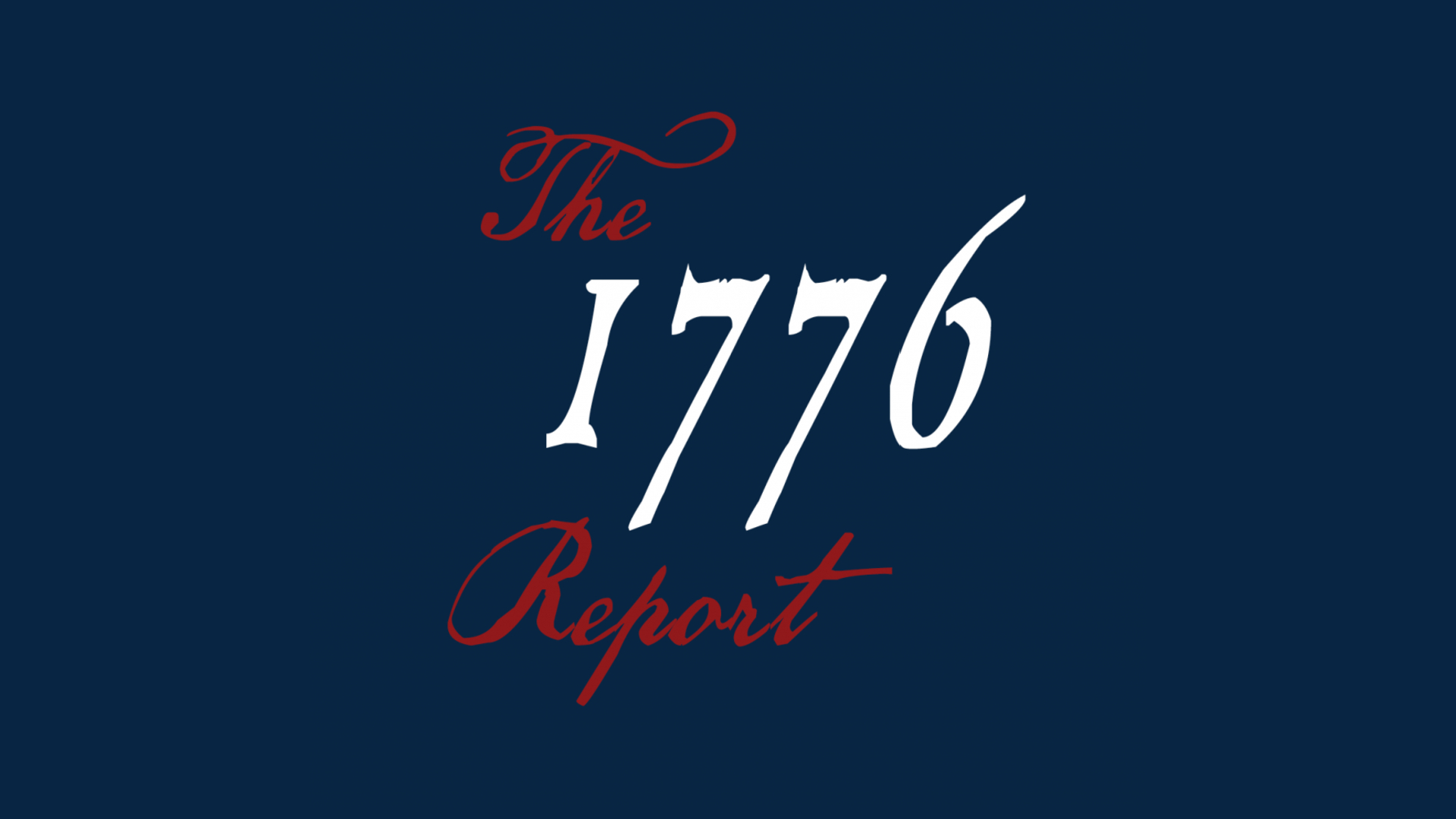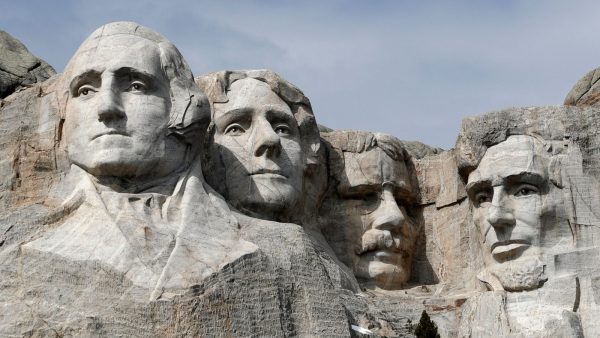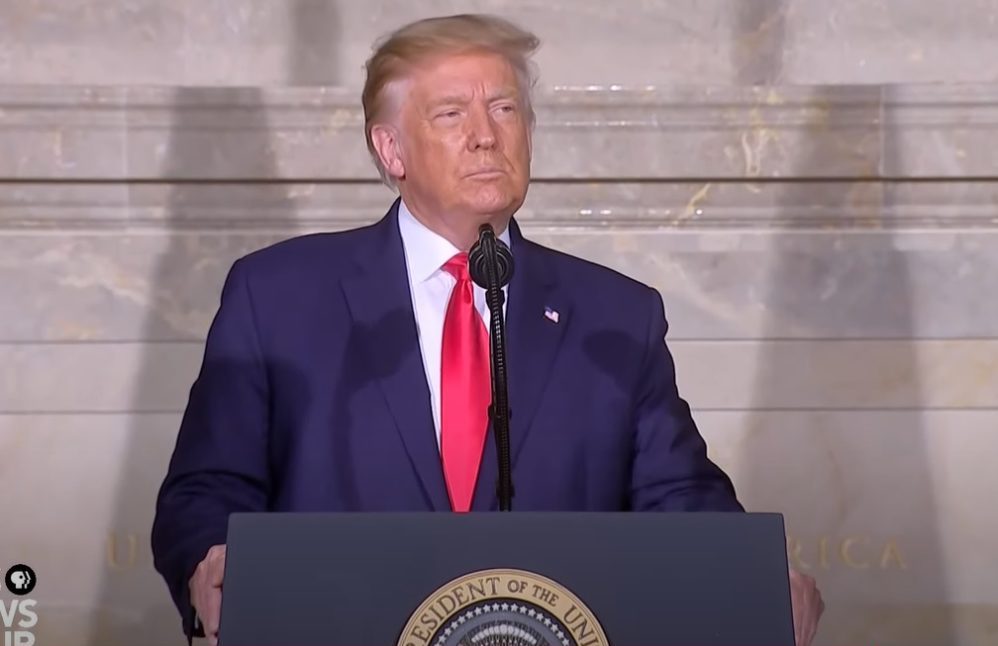President Trump and his allies are launching a counterstrike in the war on our nation’s founding.
The 1776 Report: The Meaning of the Founding

An excerpt from the 1776 Commission's report.
President Trump’s Advisory 1776 Commission released its 1776 Report on Monday. The Commission is chaired by Larry Arnn, president of Hillsdale College and Claremont Institute vice chairman. We re-publish here the sections on the Declaration of Independence and the Constitution. CNN’s headline about this report was predictably malicious: “Trump administration issues racist school curriculum report on MLK day.” Readers of these sections are likely to draw the opposite conclusion: the only path to American justice is through the principles of equal natural rights and liberty expressed in the Declaration and safeguarded in the Constitution. This is the first of two parts. Tomorrow we will publish part two: the Appendix on religious liberty, the principles of which gain fresh importance with the change to an administration hostile to the principles of the American founding.
The Meaning of the Declaration
The United States of America is in most respects a nation like any other. It embraces a people, who inhabit a territory, governed by laws administered by human beings. Like other countries, our country has borders, resources, industries, cities and towns, farms and factories, homes, schools, and houses of worship. And, although a relatively young country, its people have shared a history of common struggle and achievement, from carving communities out of a vast, untamed wilderness, to winning independence and forming a new government, through wars, industrialization, waves of immigration, technological progress, and political change.
In other respects, however, the United States is unusual. It is a republic; that is to say, its government was designed to be directed by the will of the people rather than the wishes of a single individual or a narrow class of elites. Republicanism is an ancient form of government but one uncommon throughout history, in part because of its fragility, which has tended to make republics short-lived. Contemporary Americans tend to forget how historically rare republicanism has been, in part because of the success of republicanism in our time, which is derived in no small part from the very example and success of America.
In two decisive respects, the United States of America is unique. First, it has a definite birthday: July 4th, 1776. Second, it declares from the moment of its founding not merely the principles on which its new government will be based; it asserts those principles to be true and universal: “applicable to all men and all times,” as Lincoln said.
Other nations may have birthdays. For instance, what would eventually evolve into the French Republic was born in 1789 when Parisians stormed a hated prison and launched the downfall of the French monarchy and its aristocratic regime. The Peoples Republic of China was born in 1949 when Mao Tse Tung’s Chinese Communist Party defeated the Nationalists in the Chinese Civil War. But France and China as nations—as peoples and cultures inhabiting specific territories—stretch back centuries and even millennia, over the course of many governments.
There was no United States of America before July 4th, 1776. There was not yet, formally speaking, an American people. There were, instead, living in the thirteen British colonies in North America some two-and-a-half million subjects of a distant king. Those subjects became a people by declaring themselves such and then by winning the independence they had asserted as their right.
They made that assertion on the basis of principle, not blood or kinship or what we today might call “ethnicity.” Yet this fact must be properly understood. As John Jay explained in Federalist #2,
Providence has been pleased to give this one connected country to one united people—a people descended from the same ancestors, speaking the same language, professing the same religion, attached to the same principles of government, very similar in their manners and customs, and who, by their joint counsels, arms, and efforts, fighting side by side throughout a long and bloody war, have nobly established general liberty and independence.
Yet, as Jay (and all the founders) well knew, the newly-formed American people were not quite as homogenous—in ancestry, language, or religion—as this statement would seem to assert. They were neither wholly English nor wholly Protestant nor wholly Christian. Some other basis would have to be found and asserted to bind the new people together and to which they would remain attached if they were to remain a people. That basis was the assertion of universal and eternal principles of justice and political legitimacy.
But this too must be qualified. Note that Jay lists six factors binding the American people together, of which principle is only one—the most important or decisive one, but still only one, and insufficient by itself. The American founders understood that, for republicanism to function and endure, a republican people must share a large measure of commonality in manners, customs, language, and dedication to the common good.
All states, all governments, make some claim to legitimacy—that is, an argument for why their existence and specific form are justified. Some dismiss all such claims to legitimacy as false, advanced to fool the ruled into believing that their rulers’ actions are justified when in fact those actions only serve the private interests of a few.
But no actual government understands itself this way, much less makes such a cynical claim in public. All actual governments, rather, understand themselves as just and assert a public claim as to why. At the time of the American founding, the most widespread claim was a form of the divine right of kings, that is to say, the assertion that God appoints some men, or some families, to rule and consigns the rest to be ruled.
The American founders rejected that claim. As the eighteen charges leveled against King George in the Declaration of Independence make clear, our founders considered the British government of the time to be oppressive and unjust. They had no wish to replace the arbitrary government of one tyrant with that of another.
More fundamentally, having cast off their political connection to England, our founders needed to state a new principle of political legitimacy for their new government. As the Declaration of Independence puts it, a “decent respect to the opinions of mankind” required them to explain themselves and justify their actions.
They did not merely wish to assert that they disliked British rule and so were replacing it with something they liked better. They wished to state a justification for their actions, and for the government to which it would give birth, that is both true and moral: moral because it is faithful to the truth about things.
Such a justification could only be found in the precepts of nature—specifically human nature—accessible to the human mind but not subject to the human will. Those precepts—whether understood as created by God or simply as eternal—are a given that man did not bring into being and cannot change. Hence the Declaration speaks of both “the Laws of Nature and of Nature’s God”—it appeals to both reason and revelation—as the foundation of the underlying truth of the document’s claims, and for the legitimacy of this new nation.
The core assertion of the Declaration, and the basis of the founders’ political thought, is that “all men are created equal.” From the principle of equality, the requirement for consent naturally follows: if all men are equal, then none may by right rule another without his consent.
The assertion that “all men are created equal” must also be properly understood. It does not mean that all human beings are equal in wisdom, courage, or any of the other virtues and talents that God and nature distribute unevenly among the human race. It means rather that human beings are equal in the sense that they are not by nature divided into castes, with natural rulers and ruled.
Thomas Jefferson liked to paraphrase the republican political thinker Algernon Sidney: “the mass of mankind has not been born with saddles on their backs, nor a favored few booted and spurred, ready to ride them legitimately, by the grace of God.” Superiority of talent—even a superior ability to rule—is not a divine or natural title or warrant to rule. George Washington, surely one of the ablest statesmen who ever lived, never made such an outlandish claim and, indeed, vehemently rejected such assertions made by others about him.
As Abraham Lincoln would later explain, there was no urgent need for the founders to insert into a “merely revolutionary document” this “abstract truth, applicable to all men and all times.” They could simply have told the British king they were separating and left it at that. But they enlarged the scope of their Declaration so that its principles would serve as “a rebuke and a stumbling-block to the very harbingers of re-appearing tyranny and oppression.” The finality of the truth that “all men are created equal” was intended to make impossible any return to formal or legal inequality, whether to older forms such as absolute monarchy and hereditary aristocracy, or to as-yet-unimagined forms we have seen in more recent times.
Natural equality requires not only the consent of the governed but also the recognition of fundamental human rights—including but not limited to life, liberty, and the pursuit of happiness—as well as the fundamental duty or obligation of all to respect the rights of others. These rights are found in nature and are not created by man or government; rather, men create governments to secure natural rights. Indeed, the very purpose of government is to secure these rights, which exist independently of government, whether government recognizes them or not. A bad government may deny or ignore natural rights and even prevent their exercise in the real world. But it can never negate or eliminate them.
The principles of the Declaration are universal and eternal. Yet they were asserted by a specific people, for a specific purpose, in a specific circumstance. The general principles stated in the document explain and justify the founders’ particular actions in breaking off from Great Britain, and also explain the principles upon which they would build their new government. These principles apply to all men, but the founders acted to secure only Americans’ rights, not those of all mankind. The world is still—and will always be—divided into nations, not all of which respect the rights of their people, though they should.
We confront, finally, the difficulty that the eternal principles elucidated in the Declaration were stated, and became the basis for an actual government, only a relatively short time ago. Yet if these principles are both eternal and accessible to the human mind, why were they not discovered and acted upon long before 1776?
In a sense, the precepts of the American founders were known to prior thinkers, but those thinkers stated them in entirely different terms to fit the different political and intellectual circumstances of their times. For instance, ancient philosophers appear to teach that wisdom is a genuine title to rule and that in a decisive respect all men are not created equal. Yet they also teach that it is all but impossible for any actual, living man to attain genuine wisdom. Even if wisdom is a legitimate title to rule, if perfect wisdom is unattainable by any living man, then no man is by right the ruler of any other except by their consent.
More fundamentally, by the time of the American founding, political life in the West had undergone two momentous changes. The first was the sundering of civil from religious law with the advent and widespread adoption of Christianity. The second momentous change was the emergence of multiple denominations within Christianity that undid Christian unity and in turn greatly undermined political unity. Religious differences became sources of political conflict and war. As discussed further in Appendix II, it was in response to these fundamentally new circumstances that the American founders developed the principle of religious liberty.
While the founders’ principles are both true and eternal, they cannot be understood without also understanding that they were formulated by practical men to solve real-world problems. For the founders’ solution to these problems we must turn to the Constitution.
A Constitution of Principles
It is one thing to discern and assert the true principles of political legitimacy and justice. It is quite another to establish those principles among an actual people, in an actual government, here on earth. As Winston Churchill put it in a not dissimilar context, even the best of men struggling in the most just of causes cannot guarantee victory; they can only deserve it.
The founders of the United States, perhaps miraculously, achieved what they set out to achieve. They defeated the world’s strongest military and financial power and won their independence. They then faced the task of forming a country that would honor and implement the principles upon which they had declared their independence.
The bedrock upon which the American political system is built is the rule of law. The vast difference between tyranny and the rule of law is a central theme of political thinkers back to classical antiquity. The idea that the law is superior to rulers is the cornerstone of English constitutional thought as it developed over the centuries. The concept was transferred to the American colonies, and can be seen expressed throughout colonial pamphlets and political writings. As Thomas Paine reflected in Common Sense:
For as in absolute governments the King is law, so in free countries the law ought to be king; and there ought to be no other. But lest any ill use should afterwards arise, let the crown at the conclusion of the ceremony be demolished, and scattered among the people whose right it is.
To assure such a government, Americans demanded a written legal document that would create both a structure and a process for securing their rights and liberties and spell out the divisions and limits of the powers of government. That legal document must be above ordinary legislation and day-to-day politics. That is what the founders meant by “constitution,” and why our Constitution is “the supreme Law of the Land.”
Their first attempt at a form of government, the Articles of Confederation and Perpetual Union, was adopted in the midst of the Revolutionary War and not ratified until 1781. During that time, American statesmen and citizens alike concluded that the Articles were too weak to fulfill a government’s core functions. This consensus produced the Constitutional Convention of 1787, which met in Philadelphia that summer to write the document which we have today. It is a testament to those framers’ wisdom and skill that the Constitution they produced remains the longest continually-operating written constitution in all of human history.
The meaning and purpose of the Constitution of 1787, however, cannot be understood without recourse to the principles of the Declaration of Independence—human equality, the requirement for government by consent, and the securing of natural rights—which the Constitution is intended to embody, protect, and nurture. Lincoln famously described the principles of the Declaration (borrowing from Proverbs 25:11) as an “apple of gold” and the Constitution as a “frame of silver” meant to “adorn and preserve” the apple. The latter was made for the former, not the reverse.
The form of the new government that the Constitution delineates is informed in part by the charges the Declaration levels at the British crown. For instance, the colonists charge the British king with failing to provide, or even interfering with, representative government; hence the Constitution provides for a representative legislature. It also charges the king with concentrating executive, legislative, and judicial power into the same hands, which James Madison pronounced “the very definition of tyranny.” Instead, the founders organized their new government into three coequal branches, checking and balancing the power of each against the others to reduce the risk of abuse of power.
The intent of the framers of the Constitution was to construct a government that would be sufficiently strong to perform those essential tasks that only a government can perform (such as establishing justice, ensuring domestic tranquility, providing for the common defense, and promoting the general welfare—the main tasks named in the document’s preamble), but not so strong as to jeopardize the people’s liberties. In other words, the new government needed to be strong enough to have the power to secure rights without having so much power as to enable or encourage it to infringe rights.
More specifically, the framers intended the new Constitution to keep the thirteen states united—to prevent the breakup of the Union into two or more smaller countries—while maintaining sufficient latitude and liberty for the individual states.
The advantages of union are detailed in the first fourteen papers of The Federalist (a series of essays written to urge the Constitution’s adoption), and boil down to preventing and deterring foreign adventurism in North America, avoiding conflicts between threats, achieving economies of scale, and best utilizing the diverse resources of the continent.
While the Constitution is fundamentally a compact among the American people (its first seven words are “We the People of the United States”), it was ratified by special conventions in the states. The peoples of the states admired and cherished their state governments, all of which had adopted republican constitutions before a federal constitution was completed. Hence the framers of the new national government had to respect the states’ prior existence and jealous guarding of their own prerogatives.
They also believed that the role of the federal government should be limited to performing those tasks that only a national government can do, such as providing for the nation’s security or regulating commerce between the states, and that most tasks were properly the responsibility of the states. And they believed that strong states, as competing power centers, would act as counterweights against a potentially overweening central government, in the same way that the separation of powers checks and balances the branches of the federal government.
For the founders, the principle that just government requires the consent of the governed in turn requires republicanism, because the chief way that consent is granted to a government on an ongoing basis is through the people’s participation in the political process. This is the reason the Constitution “guarantee[s] to every State in this Union a Republican Form of Government.”
Under the United States Constitution, the people are sovereign. But the people do not directly exercise their sovereignty, for instance, by voting directly in popular assemblies. Rather, they do so indirectly, through representative institutions. This is, on the most basic level, a practical requirement in a republic with a large population and extent of territory. But it is also intended to be a remedy to the defects common to all republics up to that time.
The framers of the Constitution faced a twofold challenge. They had to assure those alarmed by the historical record that the new government was not too republican in simply copying the old, failed forms, while also reassuring those concerned about overweening centralized power that the government of the new Constitution was republican enough to secure equal natural rights and prevent the reemergence of tyranny.
The main causes of prior republican failure were class conflict and tyranny of the majority. In the simplest terms, the largest single faction in any republic would tend to band together and unwisely wield their numerical strength against unpopular minorities, leading to conflict and eventual collapse. The founders’ primary remedy was union itself. Against the old idea that republics had to be small, the founders countered that the very smallness of prior republics all but guaranteed their failure. In small republics, the majority can more easily organize itself into a dominant faction; in large republics, interests become too numerous for any single faction to dominate.
The inherent or potential partisan unwisdom of a dominant faction also would be tempered by representative government. Rather than the people acting as a body, the people would instead select officeholders to represent them. This would
refine and enlarge the public views, by passing them through the medium of a chosen body of citizens, whose wisdom may best discern the true interest of their country, and whose patriotism and love of justice will be least likely to sacrifice it to temporary or partial considerations.
Federalist #10
And the separation of powers would work in concert with the principle of representation by incentivizing individual officeholders to identify their personal interests with the powers and prerogatives of their offices, and thus keep them alert to the danger of encroachments from other branches and offices.
The founders asserted that these innovations, and others, combined to create a republicanism that was at once old as well as new: true to the eternal principles and timeless ends of good government, but awake to and corrective of the deficiencies in prior examples of popular rule.
One important feature of our written constitution is the careful way that it limits the powers of each branch of government—that is, states what those branches may do, and by implication what they may not do. This is the real meaning of “limited government”: not that the government’s size or funding levels remain small, but that government’s powers and activities must remain limited to certain carefully defined areas and responsibilities as guarded by bicameralism, federalism, and the separation of powers.
The Constitution was intended to endure. But because the founders well knew that no document written by human beings could ever be perfect or anticipate every future contingency, they provided for a process to amend the document—but only by popular decision-making and not by ordinary legislation or judicial decree.
The first ten amendments, which would come to be known as the Bill of Rights, were included at the demand of those especially concerned about vesting the federal government with too much power and who wanted an enumeration of specific rights that the new government lawfully could not transgress. But all agreed that substantive rights are not granted by government; any just government exists only to secure these rights. And they specifically noted in the Ninth Amendment that the Bill of Rights was a selective and not an exclusive list; that is, the mere fact that a right is not mentioned in the Bill of Rights is neither proof nor evidence that it does not exist.
It is important to note the founders’ understanding of three of these rights that are decisive for republican government and the success of the founders’ project.
Our first freedom, religious liberty, is foremost a moral requirement of the natural freedom of the human mind. As discussed in Appendix II, it is also the indispensable solution to the political-religious problem that emerged in the modern world. Faith is both a matter of private conscience and public import, which is why the founders encouraged religious free exercise but barred the government from establishing any one national religion. The point is not merely to protect the state from religion but also to protect religion from the state so that religious institutions would flourish and pursue their divine mission among men.
Like religious liberty, freedom of speech and of the press is required by the freedom of the human mind. More plainly, it is a requirement for any government in which the people choose the direction of government policy. To choose requires public deliberation and debate. A people that cannot publicly express its opinions, exchange ideas, or openly argue about the course of its government is not free.
Finally, the right to keep and bear arms is required by the fundamental natural right to life: no man may justly be denied the means of his own defense. The political significance of this right is hardly less important. An armed people is a people capable of defending their liberty no less than their lives and is the last, desperate check against the worst tyranny.
The American Mind presents a range of perspectives. Views are writers’ own and do not necessarily represent those of The Claremont Institute.
The American Mind is a publication of the Claremont Institute, a non-profit 501(c)(3) organization, dedicated to restoring the principles of the American Founding to their rightful, preeminent authority in our national life. Interested in supporting our work? Gifts to the Claremont Institute are tax-deductible.
Our heroes will never be forgotten.
Over the next four years, conservatives risk well and truly losing the culture wars.
Trump is right: only patriotic American history can heal our deep wounds.




